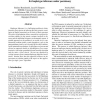Free Online Productivity Tools
i2Speak
i2Symbol
i2OCR
iTex2Img
iWeb2Print
iWeb2Shot
i2Type
iPdf2Split
iPdf2Merge
i2Bopomofo
i2Arabic
i2Style
i2Image
i2PDF
iLatex2Rtf
Sci2ools
126
click to vote
HIS
2008
2008
Towards a Highly Scalable Hybrid Metaheuristic for Haplotype Inference Under Parsimony
Haplotype Inference is a challenging problem in bioinformatics that consists in inferring the basic genetic constitution of diploid organisms on the basis of their genotype. This piece of information allows researchers to perform association studies for the genetic variants involved in diseases and the individual responses to therapeutic agents. A notable approach to the problem is to encode it as a combinatorial problem (under certain hypotheses, such as the pure parsimony) and to solve it using off-the-shelf combinatorial optimization techniques. In this paper, we present and discuss an approach based on hybridization of two metaheuristics, one being a population based learning algorithm and the other a local search. We test our approach by solving instances from common Haplotype Inference benchmarks. Results show that this approach achieves an improvement on solution quality with respect to the application of a single "pure" algorithm.
Basic Genetic Constitution | Haplotype Inference | Haplotype Inference Benchmarks | HIS 2008 | Information Technology |
| Added | 29 Oct 2010 |
| Updated | 29 Oct 2010 |
| Type | Conference |
| Year | 2008 |
| Where | HIS |
| Authors | Stefano Benedettini, Luca Di Gaspero, Andrea Roli |
Comments (0)

